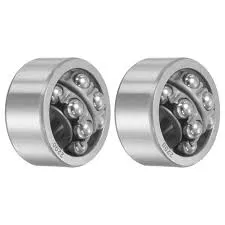
Nov . 22, 2024 06:07 Back to list
bearing roller spherical
The Importance of Spherical Roller Bearings in Industrial Applications
Spherical roller bearings are critical components widely utilized in various industries, ranging from manufacturing and automotive to aerospace and energy. Their unique design allows them to accommodate complex loads and misalignments, making them essential in systems requiring high reliability and performance. This article explores the fundamental characteristics, applications, and advantages of spherical roller bearings, alongside their role in enhancing operational efficiency.
Understanding Spherical Roller Bearings
Spherical roller bearings consist of an inner ring, outer ring, and a set of barrel-shaped rollers positioned between the two rings. The outer ring has a spherical raceway, allowing the rollers to rotate freely within it, accommodating angular misalignments occurring in related machinery. This functionality distinguishes spherical roller bearings from other types of bearings, like cylindrical and tapered roller bearings, as they can handle both radial and axial loads effectively.
The design of spherical roller bearings enables them to sustain significant load capacities while reducing friction, which contributes to their longevity and reliability in dynamic environments. They are typically made from high-quality steels and can be lubricated with oil or grease, further enhancing their performance and durability.
Applications Across Industries
Spherical roller bearings are versatile components found in numerous applications. Some common industries utilizing these bearings include
1. Manufacturing In heavy machinery and conveyor systems, spherical roller bearings provide essential support for rotating shafts and components. Their capacity to handle high loads and misalignments makes them ideal for equipment like crushers, mills, and mixers.
2. Automotive In the automotive sector, these bearings are used in different applications, including wheel hubs, drive shafts, and differential systems. Their reliability is crucial for vehicle performance and safety, reducing the likelihood of mechanical failures.
3. Aerospace The aerospace industry relies on spherical roller bearings for their ability to operate under extreme conditions. They are used in various aircraft components, such as landing gear and engines, where precision and dependability are paramount.
bearing roller spherical

Advantages of Spherical Roller Bearings
The popularity of spherical roller bearings stems from several advantages they offer. Here are some key benefits
1. High Load Capacity Their robust design allows them to handle considerable radial and axial loads, making them suitable for heavy-duty applications where performance and durability are critical.
2. Misalignment Tolerance The spherical outer ring raceway accommodates angular misalignments, which can arise from structural variances or operational conditions. This feature reduces the need for precise alignment during installation.
3. Durability and Maintenance Made from high-strength materials, spherical roller bearings exhibit high wear resistance and longevity. Additionally, they require minimal maintenance, particularly when utilizing sealed or shielded designs that reduce contamination from external elements.
4. Versatility Spherical roller bearings come in a range of sizes and configurations, allowing them to be tailored for specific applications, thus enhancing their utility across different machinery and equipment.
Conclusion
Spherical roller bearings play a vital role in numerous industrial applications by supporting heavy loads, accommodating misalignments, and performing efficiently under demanding conditions. Their unique design and robust reliability make them indispensable components in various sectors, from manufacturing to aerospace. As industries continue to evolve and push for greater efficiency and performance, the significance of spherical roller bearings is likely to grow, affirming their place as a key player in modern engineering. Proper selection, installation, and maintenance of these bearings can lead to enhanced operational efficiency, reduced downtime, and extended machinery lifespans, making them an excellent investment for businesses.
Latest news
-
Premium Deep Groove Ball Bearings | High Speed & Reliability
NewsAug.29,2025
-
Durable Scaffolding Clamps - Secure & Reliable Tube Connectors
NewsAug.28,2025
-
Common Failures in Thrust Ball Bearings and Solutions
NewsAug.22,2025
-
How Tapered Roller Bearings Can Take Shock Loads
NewsAug.22,2025
-
Angular Bearings in High-Precision Spindles
NewsAug.22,2025
-
The Impact of Misalignment on Cylindrical Roller Bearing Performance
NewsAug.22,2025
